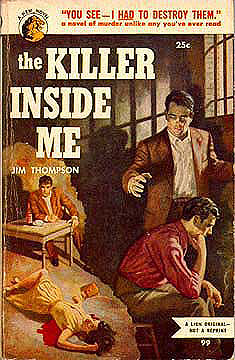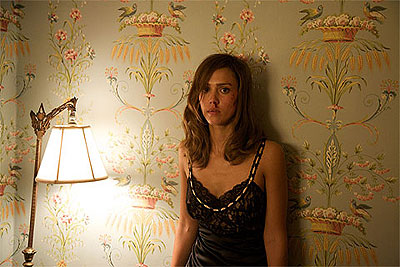The Killer Inside Me
Published on August 3rd, 2012 in: Books, Movie Reviews, Movies, Over the Gadfly's Nest |By Paul Casey

All art should be able to cover bad thoughts and bad people, as they exist, or could exist, without having to make these things pay back society in some sense. After reading Jim Thompson’s The Killer Inside Me and watching Michael Winterbottom’s 2010 adaptation, it seems that many critics demand moral payback. Taking Lou Ford and making him a cautionary tale, or something for upstanding society to feel superior to, would make a lot more people comfortable.
To make the violence in Ford’s heart against women, and against his own sack of flesh, cutaway. To position the individual sickness of the mind, and the fears of all errant weirdos—whether realized or not—in such a way so as to fit comfortably in with the dominant political climate. To give it a message, to make sure that the public knows that the creators do not endorse this worldview.
It does not have a worldview though, or a coherent ideology. It is a reflection of a chaotic mind; a mind that cannot know peace for the need to be false through and through. It is a terrifying picture for the individualist, and compromising to the golden rule of self-realization and self-fulfillment. Most can acknowledge the pain of living a lie—as George Costanza says, “I’m living a dozen.” The pursuit of happiness comes to a bad end when the price of honesty is tearing through the common social bonds and norms.
Folks are more comfortable when taboos are trampled on for something. If Lou Ford had been an anti-hero in some shape, he would be easier to take. He is not even Travis Bickle; there is little room to misinterpret Ford’s violence as anti-establishment rebellion. He does not require the idea that he is doing something good or for some greater end. He is more fearless in his rejection of society. It is the same story though, and I find it to be a powerful catharsis of the outsider problem, of the thin line of normalcy, of isolation/inclusion, the twisting power of love, and of how close violence is to affection.
To want Ford or The Killer Inside Me to be anti-this or pro-that, is to fear to go fully into one’s own head and confront the self in the way Ford does. As Taxi Driver shows so brilliantly, the line between hero and villain, old romantic and stalker is basically non-existent. A good or bad life ultimately comes down to luck. This may be why The Killer Inside Me is the purest Noir. The world is in some sense against Ford, from his beginnings. He is an unlucky man.

The line that prevents the self from careening over into sickness is less defined and reliable than we would like to believe. In the event that were forced to live a life of perversion, of violence and self-hatred, wouldn’t we at least want our own voice to be able to find some love in us? Wouldn’t we need to see some purpose? This is all Lou Ford has. Even for a terrible man, he deserves that much. I think this is why both book and Michael Winterbottom’s adaptation play so well together. They open up his nature more, though playing with exactly the same material. While reading Jim Thompson’s novel, we are at the mercy of the unreliable narrator. In the film we can observe how people really react to Lou Ford, and the results of his crimes.
Now of course to have such thoughts about real cases like this is probably foolish. This is what art is for: to bypass the need to be reasonable or practical and gain a deeper appreciation of humanity. Reducing a book or film or whatever to “This doesn’t support my very recent and modern conception of gender/sexual/racial/religious equality!” is limiting o’course, but it is mostly cowardly. It is a bother to go in to a movie, willing to—temporarily at least—rescind a set of ideas and standards that support the self. For those expressions or creations from people that don’t care to be involved in any dialogue, or progressive or regressive political movement, it is a requirement. Those creations that are truly about the individual need a brave individual to engage with them. Any critic who has to step out of a movie for violence is a terrible wimp, and should not be employed to give their opinion on anything, lest they faint at gruff words or jarring sentiments.
Censorship is designed by scared people who wish to pass on their fears to those who are not. Offense in this case, as with the recent shooting (at a screening of The Dark Knight Rises), and the re-cutting of pictures (The Gangster Squad), is a disease of the mindless; originating from those who have never quite been able to have a think on their own. That it is seen by some advocates of movie violence = real violence as a solution to real world crime, is even more of a headache. The same argument that suggests that guns don’t kill people . . . people do, is trodden upon with some ironic flair when it comes to expression in the air, on a screen or in a book.
I’m pretty sure a movie reel or DVD has never literally killed anyone—at least not in sufficient quantity to be deemed a problem—and yet they’re seen by some as a more pressing concern than outlawing assault rifles and the purchasing of thousands of rounds of ammunition. This is America’s contradiction, of course, and I’m sure in countries with strict gun control there is no similar conflict between lots of guns and censorship of ideas. The argument for protecting the weak and mindless by trapping bad ideas under cotton and removing them from sight, remains the work of a paternalistic outfit, who just know what’s good for you goshdarnit!

So what is the objection to The Killer Inside Me? That there is brutal, realistic violence done to women, on screen, and without particular comment from the creator decrying misogynists or domestic violence, I guess. It happens to people of course, and people like Lou Ford exist, but it strikes a nerve that it could be seen as entertainment. A fear of the individual, oddly enough informs so many of the reviews. Some people may find it entertaining in the wrong way, and as such we should not show it. That there may be a deeper insight to be had in the picture or book, than massaging a head of fine ideas is missed. A shame, all things considered.
Time limit is exhausted. Please reload the CAPTCHA.